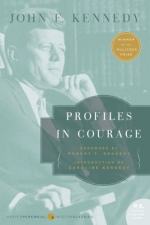|
This section contains 574 words (approx. 2 pages at 400 words per page) |

|
Chapter 11 Summary
The author calls courage the "universal virtue." He notes the many layers each of the portraits in the book show about their subjects. He does not know the cause of the courage in these subjects. He laments that the men who want to run for office like Houston and Webster are accused of ego-driven campaigns. He also laments that men like Edmund Ross and John Quincy Adams who seem to have broader goals are accused of running for office on one platform, then switching their goals once in office, betraying their voters. Overall, the author feels that each subject profiled put the nation's interest above all others. He also notes that there are different ways to show courage - from resigning to not resigning. He also suggests that the real testing ground for courage is on the national issues, where sectional loyalty and...
(read more from the Chapter 11 Summary)
|
This section contains 574 words (approx. 2 pages at 400 words per page) |

|




